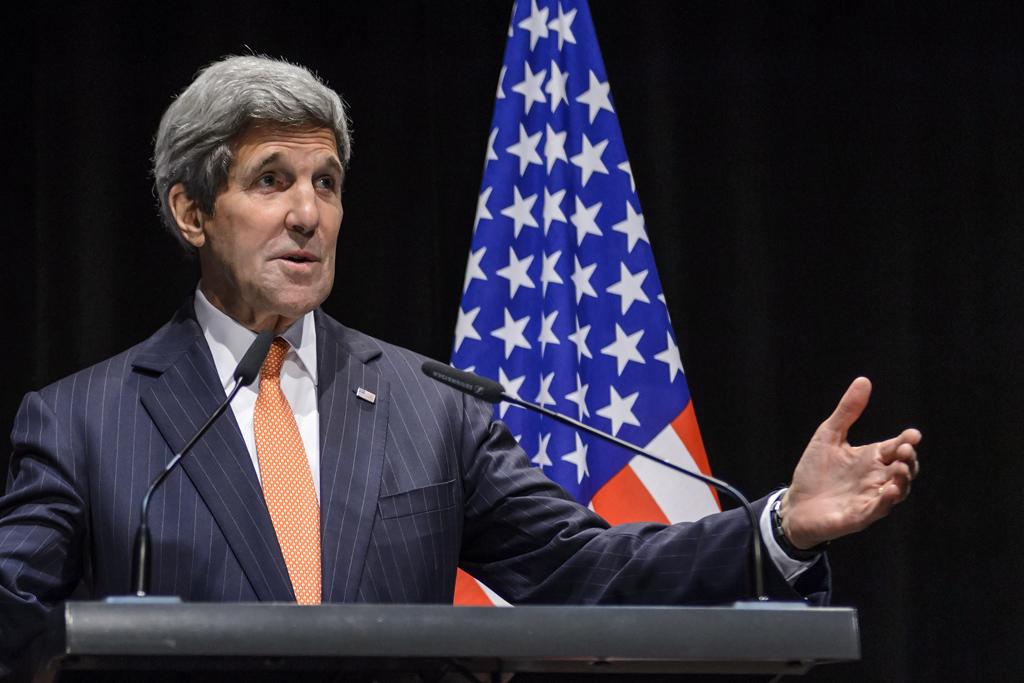Western powers pledge unity in Iran nuclear talks
US Secretary of State John Kerry delivers a statement about the recently concluded round of negotiations with Iran over their nuclear program at the International Olympic Museum in Lausanne, Switzerland, on March 21, 2015.
Western powers on Saturday played down reports of discord in their ranks and affirmed their "unity of purpose" in the Iran nuclear talks, urging the Islamic Republic to take "difficult decisions."
The British, French, German and US foreign ministers noted "substantial progress" in the discussions with Tehran, which are due to resume next week, but said there was still no agreement on some "important issues."
"We will all continue to work together with unity of purpose," read a joint statement following the talks in London, adding: "Now is the time for Iran, in particular, to take difficult decisions."
Iran and six world powers are in negotiations to clinch a landmark deal that would have the country scale back its controversial nuclear program in return for relief from sanctions.
In Tehran, President Hassan Rouhani struck an upbeat tone saying that "an agreement is possible."
"There is nothing that cannot be resolved," the official IRNA news agency quoted him as saying.
The foreign ministers' gathering in London comes a day after the latest talks between Iran and the so-called P5+1 group — Britain, China, France, Russia and the United States plus Germany — ended without a breakthrough.
US Secretary of State John Kerry, Britain's Philip Hammond, France's Laurent Fabius, Germany's Frank-Walter Steinmeier and the EU's Federica Mogherini said they were "equally committed."
"Any solution must be comprehensive, durable and verifiable. None of our countries can subscribe to a deal that does not meet these terms," they said.
'Death to America!'
Iran's supreme leader Ayatollah Ali Khamenei meanwhile moved to quell speculation that a deal with the West could lead to wider cooperation.
"No way," he told a raucous crowd in the Iranian holy city of Mashhad in a closely watched speech marking the Persian new year festival of Nowruz.
Khamenei's comments appeared to be a rejection of overtures made by US President Barack Obama that a deal could lead to cooperation, chiefly against Islamic State jihadists in Iraq and Syria.
"The lifting of sanctions is part of the negotiations and not the outcome," Khamenei told the crowd, insisting that there could be no delay between the implementation of a deal and the removal of sanctions.
"What the Iranian nation does not want is to accept what the Americans want to impose by force," he said, as the crowd chanted back: "Death to America!"
In the run-up to the London meeting on Saturday, there had been reports of differences emerging between France and the US.
France has expressed skepticism over the speed of a potential deal in which Iran would place its nuclear program under severe restrictions in exchange for a stage-by-stage lifting of international sanctions.
British newspaper The Guardian, citing diplomats, said that Paris only wanted a symbolic easing of the sanctions initially.
"The Americans are ready for an agreement that is far from the goals that were initially set," a source close to the negotiations told AFP.
'Solid and robust' deal
Iran and the US have announced that the talks would resume on Wednesday or Thursday in Switzerland.
That leaves the two sides less than a week to meet a March 31 deadline for agreeing the outlines of a nuclear deal they hope will end a 12-year stand-off.
That deadline is itself subject to debate, though, with France's ambassador to Washington Gerard Araud calling it "counter-productive and dangerous."
"Need all our time to finalise a complex agreement," he wrote on Twitter, adding that it put "pressure on ourselves to conclude at any price."
Before leaving for London, Fabius said any deal with Iran must be "solid and robust."
The complex deal on the table, due to be finalized by July, is aimed at convincing the world that Iran will not build nuclear weapons under the guise of its ongoing civilian energy program.
It would likely involve Iran reducing its nuclear activities, allowing tight inspections, and limiting development of new nuclear machinery.
In exchange, Iran — which denies wanting nuclear weapons — would get relief from the mountain of painful sanctions that have strangled its oil exports and hammered its economy.
Every day, reporters and producers at The World are hard at work bringing you human-centered news from across the globe. But we can’t do it without you. We need your support to ensure we can continue this work for another year.
Make a gift today, and you’ll help us unlock a matching gift of $67,000!
